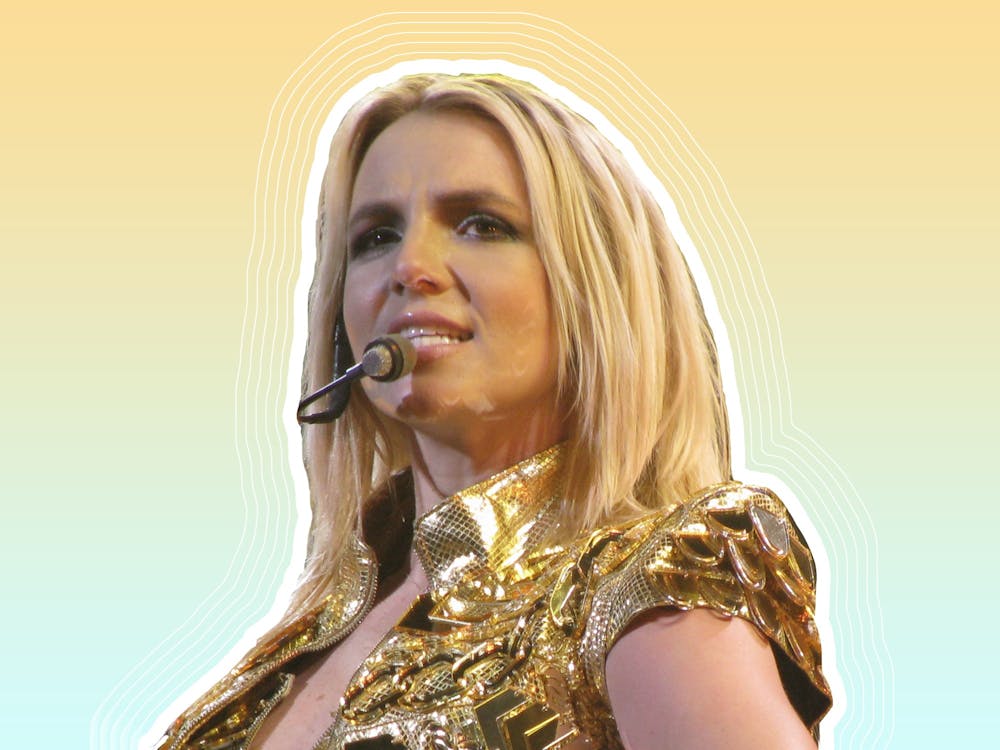Long before mental health initiatives made waves in mainstream media, Britney Spears was the voice that nourished the soul of a generation. With tracks like “Work Bitch” that empower us to persevere in our life hustles, the Princess of Pop resides in Gen Z minds and her hottest albums are squeezed into just about any early '00s playlist. While that side of the pop star keeps singing, it’s hard to imagine that a completely opposite life off-screen was molded for her 12 years ago.
In 2007, after multiple emotional breakdowns on set due to invasive paparazzi, Britney, then 25, underwent a highly public psychotic breakdown where she pulled a number of jarring acts: shaving her head, attacking paparazzi with an umbrella and wandering naked in the streets. The following year, her then-manager Sam Lufti allegedly attempted to manipulate her into giving up her estate and life finances, and threatened her to take “10 pills a day” if she wanted to see her children. The entertainer who was revealed to be suffering from substance abuse and bipolar disorder was reduced to a shaking mess “with the understanding of a young girl,” her mother accounts.
The train wreck of events left no doubt as to why the court of California ruled that the performer be temporarily protected under a conservatorship, a legal guardianship of her father Jamie Spears regarding her financial assets, estate and child custody. It was decided that Britney was not mentally capable of making sound decisions.
The pop star did not recoil from the public eye for too long, though — she soared back with the release of albums “Femme Fatale,” “Britney Jean” and “Glory,” and was found to be well enough to go on tour. Although the singer was back on stage, pulling off several high-functioning creative stunts, her return was not apparent in her personal life.
Each year, the court granted her father’s request to extend Britney’s conservatorship. In 2019, her father filed for expansion to other states including Louisiana, Hawaii and Florida. Now 38, she is still living that life — one stripped of simple freedoms like deciding who she meets, what she posts or how she spends her multimillion-dollar fortune.
The alarming disparity between Britney’s on and off-screen lives did not go unnoticed. Just two years after the court imposed Spears’ conservatorship, fans were quick to scrutinize the court ruling and its effect on Britney’s rights. In 2009, fans started voicing their concerns on freebritney.net, a website created to spread awareness of the star’s situation. The #FreeBritney movement was revived in July 2020, 11 years later. After a surge of cryptic messages surfaced from the heavily monitored entertainer’s social media account, fans believe that Britney is forcibly detained in a conservatorship with her father against her will — and they have reason to believe so.
As of Aug. 19, in the wake of the #FreeBritney outcry, Britney herself has privately opted out of her long-standing conservatorship with her father, seeking to have professional conservator Jodi Montgomery permanently take his place. Given Jamie Spears’ critical colon rupture in 2018, this is understandable. We cannot, however, dismiss larger issues running beneath the surface of her father’s health battle: Jamie has displayed a history of violent behavior, once breaking down a door to get to Britney’s 13-year-old son in the heat of an argument. Only after the incident did the court stipulate giving Britney 30% child custody over one of her sons.
Whether or not Jamie Spears is ill-intentioned cannot be informed by a singular event, but it paints a disturbing reality. It cannot be guaranteed that the conservatorship is immune to the same abuse from which it intends to protect vulnerable people.
#FreeBritney is not a simple conspiracy theory or attack on her father. It is a movement that even Britney’s mother Lynn and ex-husband Alexander (vocal in his participation in #FreeBritney rallies) supports. It is a call to uphold the personal autonomy and safety of those with mental disabilities like Britney, who are, to an extent, still capable of running their lives. The worst consequence of allowing Britney to speak for herself is a tainted celebrity image. Yet, by barring the star from speaking for herself, the court and her conservators are silencing her and potentially ruining her life. The horror of this is something we will never truly know.
Since “...Baby One More Time” first debuted on the radio, we are a generation embracing our liberation through empowered songs like Bobby Brown’s “My Prerogative” while another part of our life shrinks away in close quarters. As the 2000s performer ages, her audience has also matured. We understand that 2007 Britney is not an unprecedented break in character — it was a cathartic release of inner turmoil partially brought about by the likes of her manager or the uncontrolled paparazzi who were never held accountable.
The generation of “Stronger” will not tolerate the likes of sleazy managers and abusive parents. The hands that proudly hold up #FreeBritney banners in the air are opening eyes to the truth that those closest to us can still hurt us, and strangers can be the ones to help.
The main visionary of Britney is Britney. She was, and still is, the trendsetter, long before we knew that red bodysuits could ever be a thing. While the terms of her previous conservatorship are unchanged until 2021, Britney's proactiveness behind-the-scenes is a promising sign that she, too, is getting better at living out the inspiring messages she sings.
Get The Chronicle straight to your inbox
Signup for our weekly newsletter. Cancel at any time.

